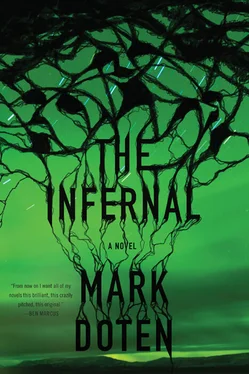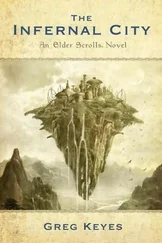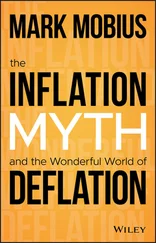Mark Doten - The Infernal
Здесь есть возможность читать онлайн «Mark Doten - The Infernal» весь текст электронной книги совершенно бесплатно (целиком полную версию без сокращений). В некоторых случаях можно слушать аудио, скачать через торрент в формате fb2 и присутствует краткое содержание. Год выпуска: 2015, Издательство: Graywolf Press, Жанр: Современная проза, на английском языке. Описание произведения, (предисловие) а так же отзывы посетителей доступны на портале библиотеки ЛибКат.
- Название:The Infernal
- Автор:
- Издательство:Graywolf Press
- Жанр:
- Год:2015
- ISBN:нет данных
- Рейтинг книги:3 / 5. Голосов: 1
-
Избранное:Добавить в избранное
- Отзывы:
-
Ваша оценка:
- 60
- 1
- 2
- 3
- 4
- 5
The Infernal: краткое содержание, описание и аннотация
Предлагаем к чтению аннотацию, описание, краткое содержание или предисловие (зависит от того, что написал сам автор книги «The Infernal»). Если вы не нашли необходимую информацию о книге — напишите в комментариях, мы постараемся отыскать её.
The Infernal
The Infernal — читать онлайн бесплатно полную книгу (весь текст) целиком
Ниже представлен текст книги, разбитый по страницам. Система сохранения места последней прочитанной страницы, позволяет с удобством читать онлайн бесплатно книгу «The Infernal», без необходимости каждый раз заново искать на чём Вы остановились. Поставьте закладку, и сможете в любой момент перейти на страницу, на которой закончили чтение.
Интервал:
Закладка:
As the patrol — a WORLD WAR II—era jeep and several uniformed men on HORSES—advanced on the Chimney, the first shadow became two, then three. Soon, a dozen or more birds cut the sky above. The CONESand NANO-MIRRORSof the Wet-Grid inclined gently in response and funneled into the Cloud a plastic composite of thousands of images, first of the birds that seemed to crosscut down and away from the Chimney even as they held to the sky above it. Past those black, oar-like wings we could see only in flashes — the flight paths were sticky, and pulled the focus of the grid — and meanwhile the grid itself was shivering: the cosmic noise in the valley had spiked, and was fed upward, into the Cloud, and we felt it at our terminals, in washes of clarity and insight (and an uptick in the agonized moans within the NEW CITY), even as the situation on the ground remained obscure.
Something was happening.
There is no sphere of AMERICANconcern to which THE COMMISSIONdoes not apply itself, but for over a century we’ve held this slip of desert very dear to our hearts.
The change, when it comes, may come quick — we have always known this.
The moment when the world system must reorganize or collapse.
THE SCOUT
[edit]
On the patrol was one who had learned, from the informal contests the soldiers sometimes staged there, how to climb the Chimney without the aid of rope or ladder. He knew which handholds could be trusted and which couldn’t, how to make it over the smooth bulge that ringed the formation halfway up — and he steered clear of the southeast corner, where attractive-looking declivities were inlaid with SCORPIONnests.
Thus did he make it to the top of the formation, where the just-visible thread of the umblical singularity pierced the valley.
Thus was he the first to take the figure in.
After rejecting what he saw, he took it in.
But only for a moment, before again rejecting it. And so he reached a compromise: he would understand the noises coming from the child, as well as the information of his VISUALand OLFACTORY SENSES(scorched hair and FLESH, for instance, intertwining, jockeying for primacy), but also: he wouldn’t. He would hold all that to one side — he would not process it. In the half-light of this compromise, he took steps to deliver himself from the vision. To interpose other bodies between himself and it.
He shouted for a canteen, and cast down a rope he’d anchored.
He kicked at the carrion birds, which had not yet begun to fill their stomachs with the flesh of the boy, driven back, perhaps, by the umbilical singularity — which was here narrow as a cello string, and beginning to hum, though it opened up to a vortex hundreds of miles in diameter as it rose up to the mesosphere.
From the top of the Chimney, the scout SEMAPHOREDback to the base.
The scout then touched him or her or perhaps it —let us allow for him —let us say him and boy , when the burns, including those between the legs, were of such severity that neither race nor gender was immediately apparent — he touched the little boy, this poor thing , as he later called him, not remembering where he’d touched the poor thing. He knew only that the flesh still burned — and his own hand was on fire in the touching, lit somehow with a clear flame. The scout stumbled backward, and did not understand it — that a living boy could be burning flesh , that he himself was burning and yet was still in motion, that his own heels now hung at the Chimney’s very lip.
He did not understand that he was still moving, still stumbling back, and did not understand, as it was happening, the fall that snapped his spine. Later he would understand — but at that moment, no. He simply could not understand: how it was that the faces of the men and horses (the bones in the horses’ faces smooth, implacable) had flown up to encircle him there, on top of the Chimney. That the faces of men and horses could have flown up around him, that a boy could be a living thing and a burning thing, both at once, and that his own body was now the fact of its new immobility and the fact of a single pain — that he, the scout, was (the scout thought) burning — that his whole body was burning up — that in this burning up he was held immobile (in truth it was only his hand that burned — with a clear flame, where he had touched the boy — the pain and immobility otherwise the pain and immobility of the fall that had snapped his spine) — this was, all of this , an outrage. The scout bared his teeth and howled at the outrage to the bodies — to the boy’s and to his own through the boy’s — howled past or against the ring of human and equine faces, over and beyond the Chimney, a sound that carried even the three kilometers back to the base — the soldiers heard the scout’s howl and heard what he howled — what he howled was the fact of their burning — and as he howled, he knew: that they both must die — both he and the poor thing , must now, this very instant , surely die — and so he howled and set the huge birds reeling across the face of the near-vertical sun.
But in this, he was mistaken.
The scout did not die at Al-Madkhanah , the Chimney.
Nor did the boy.
The scout in fact died that night.
But let us say no more of the scout (his howls scattered the buzzards, and when one became tangled in the Wet-Grid’s shimmer, the grid unthreaded itself to release the creature without harm, reconnecting along a new path …) — he matters only insofar as he impacted the boy, and that impact is at an end.
It is the boy who concerns us in this report. This impossible boy. This boy whose appearance could not be accounted for by grid or soldier. This boy who did not die. Who was brought back to the base, his eyes a pair of shallow, crusted depressions. Who had no fingernails or genitals. Whose ears were stubs; who was missing his right leg below the knee, and left arm at the elbow; the boy who had, in spite of all, a perfect pink tongue with which to speak, and would not use it.
MAKE HIM SPEAK
[edit]
We wanted to go to work on it — the tongue of the boy. But we were afraid to make it shy.
So the tongue — we did not even know with what language it might one day address us — was declared off-limits.
Alternatives were proposed.
Make him comfortable. Then make him less comfortable. Alternate comfort and discomfort. Make it clear we want something. Morphine, then withhold morphine. “And how should we make it clear what it is we want?” What does anyone ever want of a prisoner? We want INFORMATION.“Does he know he’s a prisoner?” If he doesn’t, you’d best make it your business to tell him. Comfort, discomfort.
But the prisoner was beyond comfort, we now believe — his consciousness had undergone some change. That must have been the case. One could not live like that — could not suffer the pain of those injuries without undergoing some kind of change.
If we’d had him in a place where modern medical technologies were not snuffed out , there might have been options. The medical authorities we flew in during those first critical twenty-four hours, even stripped of their glorious devices, were in agreement: to move him out of the valley would be his death. And his death would be the death of information.
Читать дальшеИнтервал:
Закладка:
Похожие книги на «The Infernal»
Представляем Вашему вниманию похожие книги на «The Infernal» списком для выбора. Мы отобрали схожую по названию и смыслу литературу в надежде предоставить читателям больше вариантов отыскать новые, интересные, ещё непрочитанные произведения.
Обсуждение, отзывы о книге «The Infernal» и просто собственные мнения читателей. Оставьте ваши комментарии, напишите, что Вы думаете о произведении, его смысле или главных героях. Укажите что конкретно понравилось, а что нет, и почему Вы так считаете.












